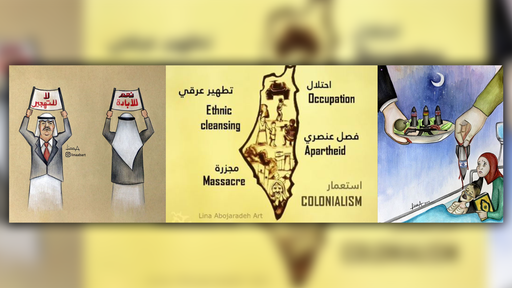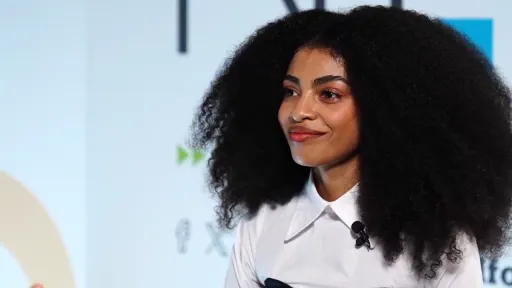It begins with a beat — but not the kind you dance to. For Sonita Alizadeh, Afghanistan’s first professional rapper, the rhythm is rebellion, and the lyrics are a lifeline.
At the NEXT 2025 organised by TRT World Forum in Istanbul on Saturday, the Afghan activist, artist, and educator took the stage not with spectacle, but with a quiet intensity that comes only from having survived what many do not.
“I use music to talk about child marriage issues that are related to human rights,” Sonita told TRT World, her words belying the gravity of her journey.
This year, the Afghan rapper is set to publish her first book, Sonita, chronicling her journey from near-child bride to global activist — a testament to the power of voice and resistance.
Sonita’s path to international advocacy was neither planned nor paved. Twice — at the ages of 10 and 16 — she was nearly sold into marriage.
“At that age, it feels like you don’t really have anyone to support you, to listen to you,” she said. “You only have two options: you can give up, or you can risk everything you have — including your life. And this was the only choice for me — to risk my life.”
From ‘Daughters for Sale’ to a global stage
Born in Herat city of western Afghanistan, Sonita fled the Taliban rule as a child with her family, seeking refuge in Iran. There, she began a new life as an undocumented Afghan immigrant. It was in Tehran — while learning to read and write at an NGO-run school for refugees — that she found her voice in poetry and music.
It was an unlikely spark — Iranian rapper Yas and Eminem’s music — that opened a channel for her defiance. “When I heard Eminem rapping, I was like, this is it. I want to tell my story — the story of my friends who came to class with bruises on their faces.”
Defying Iran’s laws that prohibited women from singing publicly, she recorded songs about being a refugee, about war, and about the burdens placed on girls. Her breakout video Daughters for Sale - where Sonita raps in Persian language - didn’t just tell those stories — it shouted them.
She uploaded it to YouTube as her family once again tried to force her into marriage so that her brother could afford his own wedding.
The video went viral, triggering global attention and, eventually, her family’s change of heart. “It was my scream,” she said. That scream earned her a scholarship to study in the US and ignited a global movement.
Her journey was captured in the Sundance award-winning documentary Sonita. A Global Rhodes Scholar, she has been widely recognised for her activism, earning honours such as MTV Europe’s Generation Change Award, the Freedom Prize and a spot on Forbes’ 30 Under 30 list. And earlier this month, she was honoured at the Cannes Lions International Festival of Creativity.
Yet for Sonita, staying true to those roots remains non-negotiable. “With art, especially rap, it’s risky because your message can be interpreted in many ways. I not only put out the music, but I also have conversations with people who follow my work, to make sure they understand what I’m trying to say.”
Activism as exhaustion — and refusal
In many ways, Sonita straddles dual identities — she is both an artist and an activist, using the former to power the latter. But the balance is never easy.
“Being an activist is exhausting,” she admitted. “You try and try and often don’t see any change. It can really disappoint you. But I taught myself to be patient — especially because creating lasting change takes time.”
Despite being thousands of miles from Herat, her mind often returns to those left behind. “I think of activists in Afghanistan who are trying to make change with empty hands — with no support. They’re working alone. When I think of them, I ask myself: why shouldn’t I continue?”
For Sonita, the answer lies in a fusion of education and expression. “I studied human rights in college — and fighting for human rights is what I do. So I combine the two. Music helps people to feel your story more deeply.”
Her advocacy has since taken her to global stages alongside heads of state, Nobel laureates, and changemakers. She’s helped develop educational curricula on child marriage that has reached over a million students. And yet, her focus remains clear: to impact the systems and beliefs that rob girls of their futures.

Palestinian artist, poet, and activist Lina Abojaradeh explains how murals, poetry, and comics can transcend headlines to evoke empathy, challenge dominant narratives, and empower the next generation at the NEXT 2025 forum in Istanbul.
A secret school — and a sanctuary of hope
One of Sonita’s proudest — and riskiest — achievements is the secret school she co-founded for Afghan girls denied education under Taliban rule. But to her, it's more than a school.
“It’s more than a building or a house — it’s a sanctuary of hope,” she said. “We give them hope. We help them to dream once again. Because when we don’t have hope or inspiration, we start to beat ourselves up. We even start to think about committing suicide.”
The school is a breeding ground for resilience. “So far, we’ve had leaders emerge from our students. They go to other communities and educate others. That’s the power of education and community work.”
When asked what she would say to young women trapped in silence, Sonita didn’t hesitate. “Never lose hope. For me, that was the core of everything. When I had no supporters, I opened my dreams book. I saw all these dreams and thought — this is why I should try harder. I need to live for myself. I need to keep trying.”
Failures, she said, are inevitable — but they’re not final. “Don’t give up when you face failure — because in life, we’re going to face many failures. So keep trying.”

From leading anti-racism protests at 13 to healing through storytelling, South African social justice activist and author Zulaikha Patel is redefining resistance, one voice—and one story—at a time.
When asked to recite lines from Daughters for Sale, Sonita hesitated. “This makes me emotional. I hate this song, but I love it too,” she said, her voice heavy with memory.
That duality — of pain and power, rage and resilience — defines Sonita Alizadeh. She is, in her own words, not just a rapper or an activist, but a girl who risked everything — and found her voice. Through her music, through her school, and through the girls she lifts up, she ensures that voice is never silenced again.
.jpg?width=1440&format=webp&quality=80)
.jpg?width=256&format=webp&quality=80)




.jpg?width=256&format=webp&quality=80)








